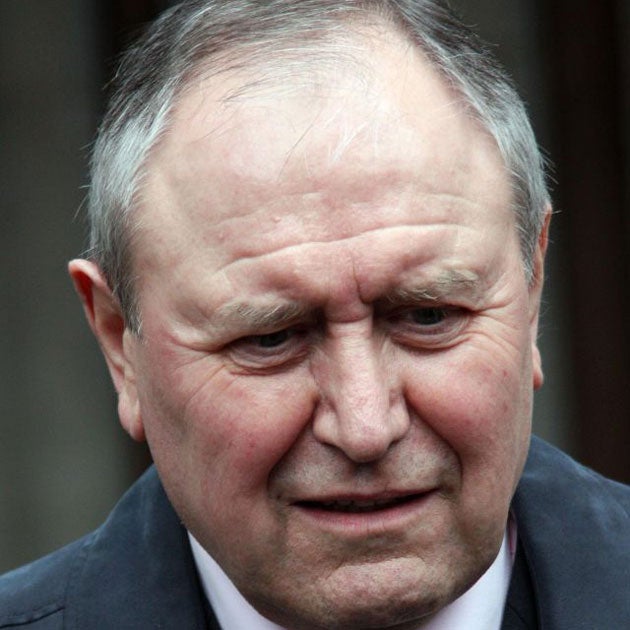George Davis wins appeal

A man whose case became part of criminal folklore after he was jailed for armed robbery finally had his conviction overturned today after decades of protesting his innocence.
But three Court of Appeal judges who announced that George Davis's 1975 Old Bailey conviction was "unsafe" also said they were unable to "positively exonerate him".
Davis, who has always denied involvement in a raid in April 1974 at the London Electricity Board (LEB) in Ilford, Essex, said afterwards that he was "delighted" his conviction had been quashed, commenting: "This is a bitter-sweet moment for me."
His case attracted widespread attention in the 1970s, with punk band Sham 69 writing a song about him, The Who singer Roger Daltrey wearing a T-shirt proclaiming his innocence and his name being daubed across railway and road bridges.
Campaigners calling for his release also vandalised the pitch at Headingley cricket ground in Leeds in 1975, causing a Test match between England and Australia to be abandoned.
Davis, now 69, who lives in London, was originally sentenced in March 1975 to 20 years for robbery and wounding with intent to resist arrest.
The same year the Court of Appeal rejected a conviction appeal bid but reduced his sentence to 17 years.
Davis's sentence was remitted by Royal Prerogative and he was released from prison in 1976.
He was arrested again in September 1977 and later pleaded guilty to his involvement in an armed robbery at the Bank of Cyprus in London. He was sentenced to 15 years, reduced to 11 years on appeal.
Today's ruling by Lord Justice Hughes, Mr Justice Henriques and Mrs Justice Macur followed a referral of his case to the Court of Appeal by the Criminal Cases Review Commission (CCRC), an independent body which investigates possible miscarriages of justice.
Davis's legal team argued that evidence to show the convictions for the LEB raid were unsafe "has been in the hands of the authorities since at least 1977".
He won his appeal today on the basis of fresh material relating to identification evidence.
Lord Justice Hughes said material relating to identifications made by those at the scene of the robbery, and "limited new evidence" affecting the "very positive identification" given by another witness, "so far undermines the case that it is impossible to be satisfied that this conviction is safe".
But he said: "We do not know whether Davis was guilty or not, but his conviction cannot be said to be safe."
The judge added: "As we have made clear, the fact that he was an active and known criminal does not affect this question, nor does it make it any the less important that his conviction should not be upheld unless it is clear that it is safe."
Following the decision, Davis said he had always claimed he had been falsely identified "but it should not have taken 36 long years for me to be able to stand here like this".
He said: "I have made it clear that I have no intention of seeking compensation for my wrongful conviction.
"I have pursued this appeal for all these years because I wanted all those people who worked for, and helped, the campaign in the 1970s to know that their support was justified."
At his trial, the prosecution relied on identifications of Davis, at identification parades, by two officers who were at the robbery scene and three other officers from a different location, Woodford Avenue.
Lord Justice Hughes said "new material affecting the identifications of the two policemen at the scene of the robbery is of considerable significance".
He added: "We bear in mind that both behaved with exemplary courage and that the attack under which they personally came will have made it very difficult for them to have made dispassionate observations.
"However, we have no doubt ... neither identification can be safely relied upon."
Lord Justice Hughes said the court was "acutely conscious" of the fact that the jury also had identifications of Davis by the three other officers and by a witness called Mrs Bone, "and that the other defendants were not so identified".
He added: "It is, therefore, possible that the jury discounted in any event the scene of the robbery identifications and relied on the Woodford Avenue ones; this might be the explanation for the decision to convict Davis and not the other defendants.
"The question of safety is for this court. It is not ... answered simply by asking whether the fresh information now available might have affected the jury's deliberations.
"We take the view, however, that it is simply impossible for this court, at the remove of over 30 years, to weigh the evidence as it would be necessary to do to resolve that the conviction is soundly based."
When the then Home Secretary Roy Jenkins remitted the balance of Davis's sentence in May 1976 he did so, said the judge, on the basis that he was "satisfied that the identification evidence has been seriously weakened", but that he did not "have the evidence of innocence to justify recommending a free pardon".
Lord Justice Hughes said the Court of Appeal was in "a similar state of ignorance whether or not the defendant committed this robbery and we are unable positively to exonerate him".
Bookmark popover
Removed from bookmarks